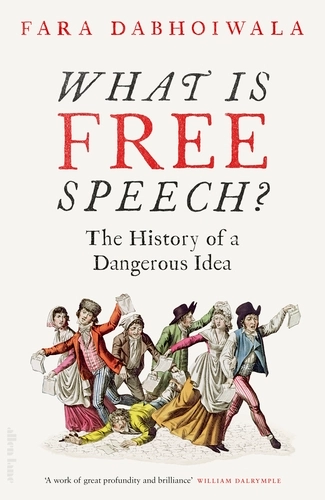‘Free Speech!’ is a clarion call all over the world, yet what it means today is more contested than ever. Many cultures regard it as dangerous: in China, India, and across the Islamic world, unorthodox views about politics, sex, and religion are repressed and people are often punished for expressing them. Even in the western world, where it is held up as a core value, there is widespread discord and disagreement about what freedom of expression means. Amidst perennial imbalances of power, continually evolving cultural taboos, dramatic new technologies and a fast-changing global media landscape, where free speech comes from – and how we might think about it – are critical questions.
Through the lens of history, What Is Free Speech? shows us that freedom of speech is not an absolute from which societies and regimes have drifted or dissented at different times, but something more complicated and interesting.
Our modern conceptions of press and speech liberty, Dabhoiwala shows, were invented in Britain around 1700. The real history of freedom of expression is a story of countless fascinating men and women whose lives have shaped its principles and practices over the past 300 years – slaves and imperialists, poets and philosophers, plutocrats and revolutionaries. Ranging across Europe, North America and South Asia, and not neglecting other parts of the world, Dabhoiwala rejects celebratory platitudes about the past and present of free expression. Instead, his book explains how to think more deeply about free speech as a global as well as a local question — by tracing how we got into our current predicaments, showing that history complicates our contemporary presumptions, and suggesting fresh possibilities for the future.
Read more
A brilliant history [of what] has long been a “weaponized mantra” in a public sphere dominated by the moneyed and the powerful, this fascinating book questions whether such a misunderstood ideal should be lauded as an end in itself … Dabhoiwala wants us to think of free speech in terms of which voices are heard most loudly and which are marginalised … meticulous and much-needed.
Joe Moran, Guardian
A rich and wide-ranging history which reminds us that disagreement over what may be printed or said in public has long been ferocious … Dabhoiwala here corrects misconceptions, confirms how most arguments over speech are arguments at the same time about something else [and] reminds us that who defines it, who enjoys it and who regulates it is politics all the way down
Edmund Fawcett, Financial Times
There could be no better guide than Fara Dabhoiwala … What Is Free Speech? makes you think afresh about the subject [and shows how] the history of free speech is its incurably accidental nature
Ferdinand Mount, London Review of Books
Tracing a global history of speaking freely is no small task. Dabhoiwala tracks the vicissitudes of the idea with gusto, through religious prohibitions, monarchical edicts, colonial suppression of slave speech, and the perennial existence of misinformation … an ambitious feat
Nina Power, Telegraph
Thought-provoking … Fara Dabhoiwala trace[s] the history of freedom of expression as an intellectual concept and a political programme [and] set[s] out his views on its limitations and contradictions
Jonathan Sumption, Literary Review


